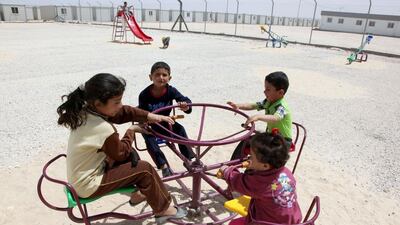The UAE was the world’s 16th-biggest donor of foreign aid in 2012, with the country spending Dh5.83 billion in 137 countries and earmarking a further Dh5.59bn for future projects.
The Government was the country’s greatest contributor, spending Dh2.62bn while the Abu Dhabi Fund for Development (ADFD) was the next biggest spender, donating Dh1.28bn. The Khalifa bin Zayed Al Nahyan Foundation was third, spending Dh563 million.
Sheikh Mohammed bin Rashid, Vice President and Ruler of Dubai, said the figures proved the country’s worth as an international role model with its commitment to Islamic teachings and helping the needy.
“The UAE does not provide conditional aid or wait for a return, the motivation to provide humanitarian aid is its strong keenness to contribute to achieving stability and provide a dignified life for all peoples, regardless of their race or religion.”
He singled out President Sheikh Khalifa for praise, calling him a “pioneer in humanitarian work without peer” and saying “aid provided by him alone stood highest among all the Government or private institutions in the country”.
A comprehensive report by the Ministry of International Cooperation and Development was released yesterday detailing the various donations and grants by the government and 43 semi-government and private organisations.
The majority of funds – Dh5.07bn – went towards development, with Dh400m going to humanitarian services and Dh360m going to charity.
Jordan received the greatest amount of aid – Dh967m – the bulk of which (Dh925m) went towards development projects while Dh40m went to humanitarian services and Dh2m to charity. It was followed by the Palestinian Territories, Afghanistan and Pakistan.
The Palestinian National Authority benefited from Dh507m for its operational activities and Dh42m for its programmes in Jerusalem, while Dubai police also trained 19 Palestinian officers.
Countries in Western Asia received seven times as much aid from the UAE than in 2010. Azarbaijan, received Dh199m, Dh193m of which was in the form of a concessionary loan from ADFD to help finance a thermal power plant.
Assistance to Lebanon increased almost 30 per cent from 2011 – much of which went towards care services for 8,024 children who lost one or both parents.
ADFD distributed Dh1.28bn to projects in 29 countries. The fund focused on energy generation and supply – it spent Dh369.7m in those areas. The fund granted Dh44m to the Seychelles for a wind power station to replace its diesel-operated plants. It also provided grants for the construction of roads and bridges in countries including Afghanistan, Albania, Benin, Morocco and Tanzania.
Its other projects included building housing in Afghanistan and the Maldives, urban development projects in Algeria, Bahrain and Egypt and hydro-electric power facilities in Burkina Faso.
The Khalifa bin Zayed Al Nahyan Foundation, the country’s third top donor, granted Dh563m to projects in 65 countries. A large chunk of this – Dh222m – went to the MD Anderson Cancer Centre in Houston, Texas, for its Ahmed bin Zayed Cancer Centre and Sheikh Khalifa bin Zayed Al Nahyan Institute for cancer therapy.
Twenty-four women and children who were victims of human trafficking received Dh100,000 worth of support from Ewa’a shelters, including medical and psychological treatment, shelter, legal assistance, vocational training and airline tickets home.
Individual donors and the private sector also gave generously, with two unidentified private fundraisers raising Dh7.6m.
The report also broke down which sectors benefited from the funds. General assistance accounted for Dh2.24bn, health accounted for Dh200m, transport and storage for Dh348m and tourism Dh35m.
hdajani@thenational.ae
This story has been modified to clarify that the aid given was in dirhams and not dollars and originally stated.


